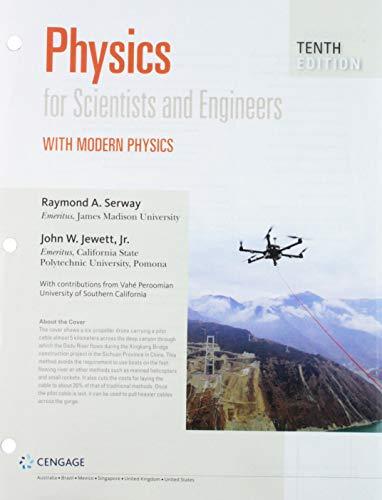
Bundle: Physics For Scientists And Engineers With Modern Physics, Loose-leaf Version, 10th + Webassign Printed Access Card For Serway/jewett's Physics For Scientists And Engineers, 10th, Single-term
10th Edition
ISBN: 9781337888585
Author: Raymond A. Serway, John W. Jewett
Publisher: Cengage Learning
expand_more
expand_more
format_list_bulleted
Concept explainers
Question
Chapter 43, Problem 35P
(a)
To determine
The required distance of closest approach between the centers of reactant nuclei.
(b)
To determine
The electric potential energy at distance of closest approach between the centers of reactant nuclei.
(c)
To determine
The common speed of deuterium and tritium nuclei in terms of initial deuterium speed.
(d)
To determine
The minimum initial energy required to achieve fusion.
(e)
To determine
The reason for the fusion reaction actually occurs at much lower deuteron energies than in part (d).
Expert Solution & Answer
Want to see the full answer?
Check out a sample textbook solution
Students have asked these similar questions
56 is not the correct answer!
81 SSM Figure 29-84 shows a cross
section of an infinite conducting
sheet carrying a current per unit
x-length of 2; the current emerges
perpendicularly out of the page.
(a) Use the Biot-Savart law and
symmetry to show that for all points
B
•P
x
B
P'.
Figure 29-84 Problem 81.
P above the sheet and all points P' below it, the magnetic field B
is parallel to the sheet and directed as shown. (b) Use Ampere's
law to prove that B = ½µλ at all points P and P'.
(λvacuum =640nm)
red light
(λ vacuum = 640 nm) and green light
perpendicularly
on a soap film (n=1.31)
A mixture of
(a vacuum = 512 nm) shines
that has air on both side. What is the minimum nonzero
thickness of the film, so that destructive interference
to look red in reflected light?
nm
Causes it
Chapter 43 Solutions
Bundle: Physics For Scientists And Engineers With Modern Physics, Loose-leaf Version, 10th + Webassign Printed Access Card For Serway/jewett's Physics For Scientists And Engineers, 10th, Single-term
Ch. 43.1 - Prob. 43.1QQCh. 43.5 - Prob. 43.3QQCh. 43.5 - Which of the following is the correct daughter...Ch. 43.8 - When a nucleus undergoes fission, the two daughter...Ch. 43.8 - Prob. 43.6QQCh. 43.10 - Prob. 43.7QQCh. 43 - Prob. 1PCh. 43 - Prob. 2PCh. 43 - Prob. 3PCh. 43 - Prob. 4P
Ch. 43 - Prob. 5PCh. 43 - Prob. 7PCh. 43 - Prob. 8PCh. 43 - Prob. 9PCh. 43 - Prob. 10PCh. 43 - Prob. 11PCh. 43 - Prob. 13PCh. 43 - Prob. 15PCh. 43 - Prob. 17PCh. 43 - Prob. 18PCh. 43 - Prob. 19PCh. 43 - Prob. 20PCh. 43 - Prob. 21PCh. 43 - Prob. 22PCh. 43 - Prob. 23PCh. 43 - Prob. 24PCh. 43 - Enter the correct nuclide symbol in each open tan...Ch. 43 - Prob. 26PCh. 43 - Prob. 27PCh. 43 - Prob. 28PCh. 43 - Prob. 29PCh. 43 - Prob. 30PCh. 43 - Prob. 32PCh. 43 - Prob. 33PCh. 43 - Prob. 35PCh. 43 - Prob. 37PCh. 43 - Prob. 39PCh. 43 - Prob. 41PCh. 43 - Prob. 42PCh. 43 - Prob. 44PCh. 43 - Prob. 45APCh. 43 - Prob. 46APCh. 43 - Prob. 47APCh. 43 - Prob. 48APCh. 43 - Prob. 49APCh. 43 - Prob. 50APCh. 43 - Prob. 51APCh. 43 - Prob. 52APCh. 43 - As part of his discovery of the neutron in 1932,...Ch. 43 - Prob. 55APCh. 43 - Prob. 56APCh. 43 - Prob. 58APCh. 43 - Prob. 59APCh. 43 - Prob. 60APCh. 43 - Prob. 62APCh. 43 - Prob. 63APCh. 43 - Prob. 64APCh. 43 - Prob. 65APCh. 43 - Prob. 66CP
Knowledge Booster
Learn more about
Need a deep-dive on the concept behind this application? Look no further. Learn more about this topic, physics and related others by exploring similar questions and additional content below.Similar questions
- Suppose the inteference pattern shown in the figure below is produced by monochromatic light passing through a diffraction grating, that has 260 lines/mm, and onto a screen 1.40m away. What is the wavelength of light if the distance between the dashed lines is 180cm? nmarrow_forwardHow many (whole) dark fringes will produced on on an infinitely large screen if red light (2)=700 nm) is incident on two slits that are 20.0 μm apart?arrow_forwardCan someone help me with this physics 2 problem thank you.arrow_forward
arrow_back_ios
SEE MORE QUESTIONS
arrow_forward_ios
Recommended textbooks for you
 Principles of Physics: A Calculus-Based TextPhysicsISBN:9781133104261Author:Raymond A. Serway, John W. JewettPublisher:Cengage Learning
Principles of Physics: A Calculus-Based TextPhysicsISBN:9781133104261Author:Raymond A. Serway, John W. JewettPublisher:Cengage Learning Modern PhysicsPhysicsISBN:9781111794378Author:Raymond A. Serway, Clement J. Moses, Curt A. MoyerPublisher:Cengage Learning
Modern PhysicsPhysicsISBN:9781111794378Author:Raymond A. Serway, Clement J. Moses, Curt A. MoyerPublisher:Cengage Learning College PhysicsPhysicsISBN:9781305952300Author:Raymond A. Serway, Chris VuillePublisher:Cengage Learning
College PhysicsPhysicsISBN:9781305952300Author:Raymond A. Serway, Chris VuillePublisher:Cengage Learning College PhysicsPhysicsISBN:9781285737027Author:Raymond A. Serway, Chris VuillePublisher:Cengage Learning
College PhysicsPhysicsISBN:9781285737027Author:Raymond A. Serway, Chris VuillePublisher:Cengage Learning College PhysicsPhysicsISBN:9781938168000Author:Paul Peter Urone, Roger HinrichsPublisher:OpenStax College
College PhysicsPhysicsISBN:9781938168000Author:Paul Peter Urone, Roger HinrichsPublisher:OpenStax College University Physics Volume 3PhysicsISBN:9781938168185Author:William Moebs, Jeff SannyPublisher:OpenStax
University Physics Volume 3PhysicsISBN:9781938168185Author:William Moebs, Jeff SannyPublisher:OpenStax

Principles of Physics: A Calculus-Based Text
Physics
ISBN:9781133104261
Author:Raymond A. Serway, John W. Jewett
Publisher:Cengage Learning

Modern Physics
Physics
ISBN:9781111794378
Author:Raymond A. Serway, Clement J. Moses, Curt A. Moyer
Publisher:Cengage Learning

College Physics
Physics
ISBN:9781305952300
Author:Raymond A. Serway, Chris Vuille
Publisher:Cengage Learning

College Physics
Physics
ISBN:9781285737027
Author:Raymond A. Serway, Chris Vuille
Publisher:Cengage Learning

College Physics
Physics
ISBN:9781938168000
Author:Paul Peter Urone, Roger Hinrichs
Publisher:OpenStax College

University Physics Volume 3
Physics
ISBN:9781938168185
Author:William Moebs, Jeff Sanny
Publisher:OpenStax